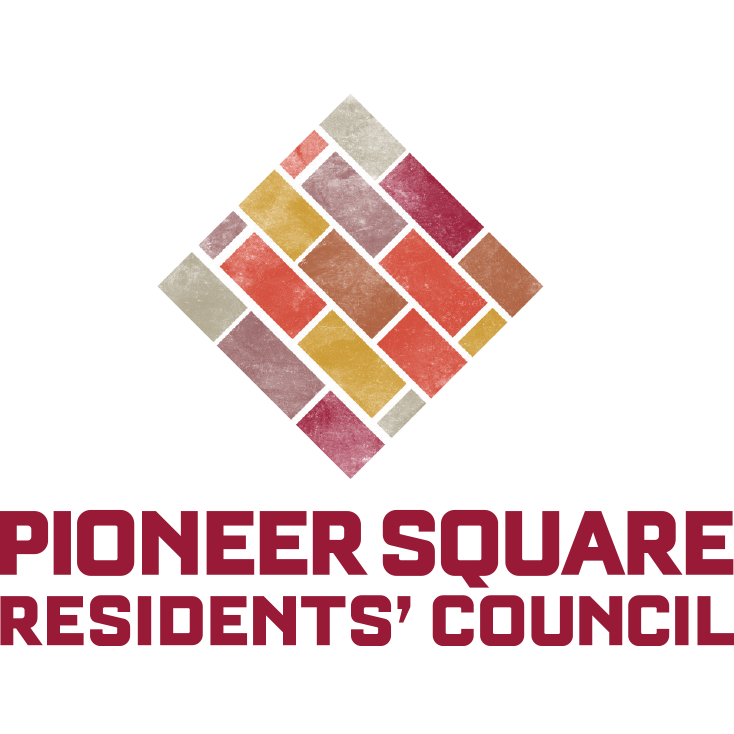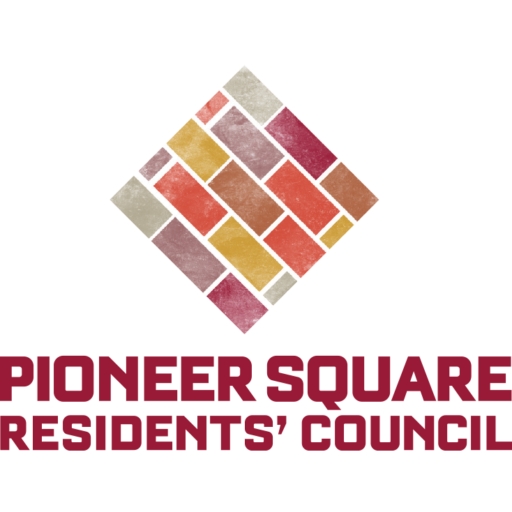12 Jan What do the police do for Pioneer Square?
I spent about 3 hours on Saturday pretending I was in law enforcement. Who doesn’t want the opportunity to do that? It’s kind of like being part of Law & Order, but not actually having to risk your life or do any paperwork afterwards. Part of the ride along was spent discussing the neighborhood, while the majority of the time was spent driving around the neighborhood, seeing what a normal day is like for the neighborhood police.
Driving down Washington Avenue in Pioneer Square, other cars slowed down and people seemed to be thinking twice about what they were doing. Suddenly Sergeant Hancock hit the brakes right before we entered the intersection as 3 homeless men started jaywalking and almost walked right in front of the squad car.
And then came the reality of being a police officer in Pioneer Square. As the Sgt. got out of the car and approached them, two of the homeless men started talking nonstop saying “sorry sir” and “we didn’t see the sign, sir” as they backed up to the curb. The third man was a different story, however. He had a teardrop tattoo next to his eye (a gang symbol for killing someone or losing one of your own) and was giving what Sergeant Hancock called “the 1,000 yard stare” — basically looking right through him.
I couldn’t hear the conversation, but after he got back in the car, he said that that was one individual that you should cross the street for. Not only was he drunk, but also on drugs (which made him very unstable), and happened to be staying at DESC, a homeless shelter on 3rd. He checked him out in the system and when there were no problems on his record, he told him to go straight to DESC. This was just one of many that he stopped and questioned about what they were doing and why they were in Pioneer Square.
Sergeant Hancock runs an 8 officer daytime bike squad for the West Precinct. According to SPD’s website, “there are day and night bike patrol squads proactively participating in undercover and on view narcotics enforcement, crowd control and continually responding to 9-1-1 calls.”
Before we went out into the neighborhood, we sat for a little bit to talk about Pioneer Square and the role of the police in the neighborhood. The West Precinct Bike Squads cover from Pike/Pine down through Pioneer Square and East over to Chinatown/International District. Not only is the squad extremely fit from a rigorous training regimen and from biking all over downtown, but they also have a strong connection to the neighborhood by being visible to the residents and the trouble makers.
Sgt. Hancock said he wasn’t boasting or biased when he said that the downtown core benefits from having a bike squad comprised of some of the best officers in the region.
Here are some of the other things I learned from our discussion:
- Don’t Jaywalk in Pioneer Square. And if you do, whatever you do, don’t tell the officer you’re from New York. That will guarantee you a ticket.
- Fines for leaving crap on the sidewalk:
- $57 for your dog
- $26 for you
- What’s wrong with this picture?
- The bike squad finishes their shift at 6pm and the next squad doesn’t come on until around 9 or 10pm. The drug dealers know this. If you notice a spike of drug dealing out in the open during those hours, this is why
- If businesses stopped selling single cans of beer throughout the city, we would have a lot less problems
- Pioneer Square is safer than many many other areas in the West Precinct. People just need to start believing that statement
- Homeless aren’t just coming to Seattle from the rest of the US, they’re now coming from all over the world — immigrants decide to come to this country, and then hear that Seattle is the place to be homeless — they’re just so well taken care of here
- The bike cops know must of the drug dealers/offenders by name (which is incredible).
- There’s only so much the police can do to “solve” the drug problems — for real change to happen, laws need to change. The new administration needs to take another look at the drug laws in our city.
When I asked Sgt. Hancock if people should feel safe in the neighborhood — he thought about it for a second and then responded that unfortunately, perception is reality. And because people don’t perceive that they are safe, they’re not going to feel safe. He said that they really are safe, however — it is still a downtown neighborhood (as I’ve said before), but as far as being attacked or robbed, there are places in Belltown that he would be much more nervous about. Most violence in the neighborhood happens to people who are involved in the drug world, or people who are drunk and leaving bars in the early hours of the morning. It doesn’t happen to tourists in the neighborhood, or residents that are out and about.
People are very quick to blame the police for many of the problems in a city, but from the small snapshot I had, they work extremely hard to keep things under control and safe for the residents. Sgt. Hancock said that a lot of what they do is just sticking their fingers in the dike, hoping to plug the holes that keep popping up. Essentially putting a bandaid on gaping wound to help with the bleeding.
It’s easy to tell the police to increase numbers — get more cops out on the street so that people perceive that they are safer. Although this would definitely help, I appreciate what Captain Brown said after the Revitalization Committee meeting. He said that he’s not going to make any real changes until there is a solid plan in place. He needs to be able to have assurances from the administration that changes will happen and the police and the government need to be able to work together to figure out a long term solution.
Three individuals were arrested during my ride along on Saturday. Do you want to guess what’s going to happen to them? Although we literally watched them deal and do drugs, they will most likely only be charged with a misdemeanor of drug possession, and if they go to prison, they will be out and on the streets in a matter of days. Sometimes we’re lucky and they may go to prison for a week. But only if we’re lucky.
I’m writing another part to this story — it covers the first hour of being out on the streets with the bike patrol (the exciting part), an overview of problems at the Lazarus, the three drug arrests, and what I think is the most interesting part: what they’re doing when you can’t see them.
UPDATE
Just received this in an email from a reader (thanks Karen!)
There’s a talk at Town Hall this Thurs at 7:30pm by author Gabor Mate, who’s an MD pioneer in “harm reduction” for a way of dealing with drug addiction. He works in Vancouver, BC with street addicts in one of the toughest neighborhoods and our former Police Chief, Norm Stamper (a harm reduction advocate) will be doing the intro. Seattle has done a bit with needle exchanges, which is why the HIV rate here is as stable as it is among addicts but these types of programs are very controversial. They do save lives, though. Details at www.townhallseattle.org.
Tickets are $5 (at the door starting at 6:30), or buy in advance at brownpapertickets



Pingback:Tweets that mention The New Pioneer Square- What do the police do for Pioneer Square? – Blog Title -- Topsy.com
Posted at 17:02h, 12 January[…] This post was mentioned on Twitter by Beacon Hill Blog, Gerard Gravallese and TheNewPioneerSquare, TheNewPioneerSquare. TheNewPioneerSquare said: What do the police do for Pioneer Square http://bit.ly/5r1XLv Part 1 of my ride along […]
Pingback:The New Pioneer Square- Drug busts, homelessness, and a positive outlook – Blog Title
Posted at 12:23h, 14 January[…] Tuesday, I wrote some insights to what the police do in Pioneer Square and some of the general problems our neighborhood faces. Today, I’m writing about the […]
uberVU - social comments
Posted at 13:51h, 14 JanuarySocial comments and analytics for this post…
This post was mentioned on Twitter by beaconhillblog: Fines in Seattle for leaving crap on the sidewalk: $57 if it’s your dog’s, $26 if it’s yours. (via http://bit.ly/7h8t56 @TheNewP2)…